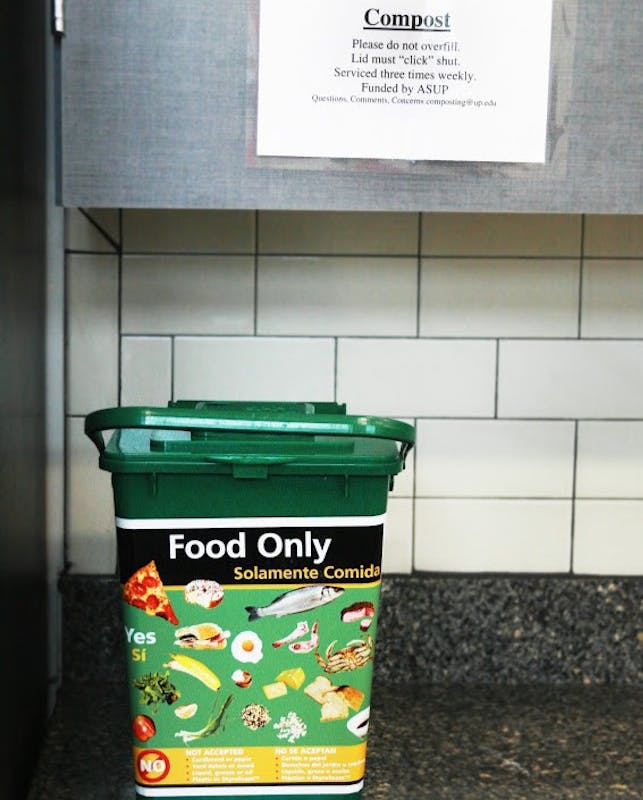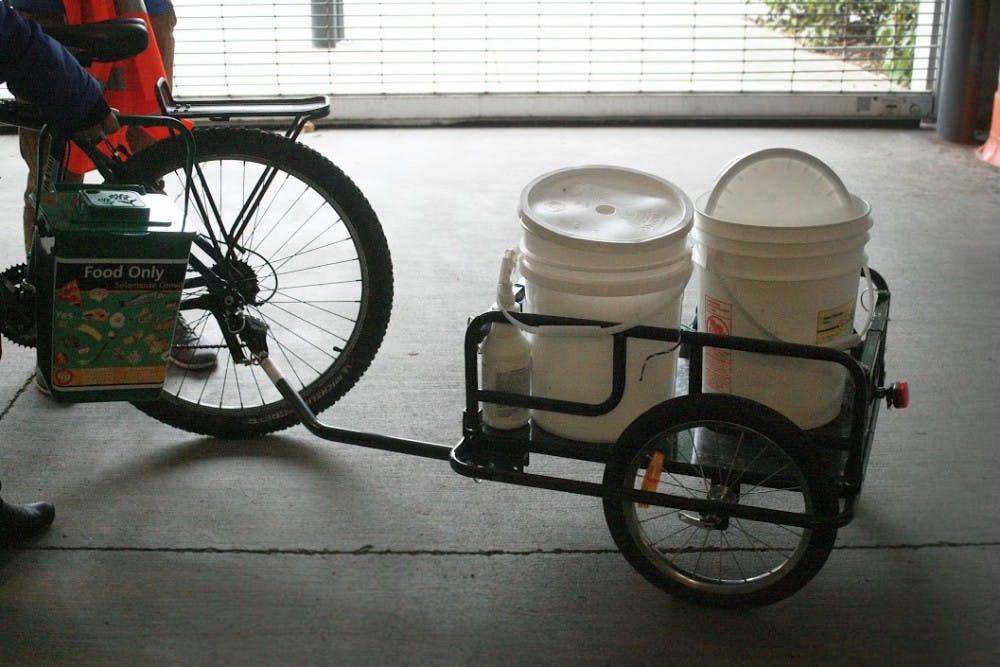Students living on campus may have noticed the green compost bins popping up in the communal kitchens in dorms across campus. Students might idly scrape food into them without giving the bins a second thought. However, the use of dorm compost bins has been a goal for senior nursing major Gabe Wihtol for a long time.
Wihtol got the idea of having compost bins in dorms last year when he was a Sustainability Coordinator for Christie Hall. As a part of his sustainability seminar class, he and other sustainability coordinators performed a “garbage audit” experiment in Mehling Hall. The coordinators placed compost bins all through Mehling Hall to see how much food waste could be collected. To Wihtol, the results were shocking.
“We found that there was a 75 percent reduction of food waste going into the trash,” Wihtol said. “We went from 25 pounds of food waste in the trash to 6 pounds of food waste.”
This year, Wihtol took the sustainability coordinator’s composting experiment and turned it into a dorm-living lifestyle. After much lobbying and organization, Wihtol has started UP’s first ever student-run dorm composting program.
Since its start on Feb. 3, Wihtol and his workers have collected about 350 pounds of compost from dorm composting bins, as of Feb. 28. Though the program has been “going really well” according to Wihtol, he worries that the program won’t last beyond this year.

Wihtol wrote up a budget and plan for the composting program at the beginning of the year presented it to different departments, including Physical Plant and Residential Life, but was unable to find funding to pay the student workers. Physical Plant agreed to support the program by providing new compost bins, liners and sanitizer spray bottles.
Wihtol presented the budget to ASUP on Nov. 21 at a senate meeting, hoping they would support the program financially via its discretionary fund — money set aside by ASUP to fund a project that the Senate votes on.
“I knew it had to happen this year otherwise it wasn’t going to happen,” Wihtol said. “So I decided I was going to get temporary funding from ASUP. I went to ASUP and I went to all their meetings and lobbied with the senators and urged them to support a temporary composting program. And they voted yes on that. I presented to them saying, ‘This is the kick starter fund, so if you put in now, it will prove to the administration that we’re serious about this.’”
ASUP voted unanimously to financially support the program this semester with their discretionary fund. Jeromy Koffler, Director of Student Activities, agreed to temporarily support the program by signing off on Wihtol and other compost workers’ time sheets.
“We were like, ‘Funding this is a no-brainer,’” Kathleen Burks, ASUP sophomore senator said. “This program is going to benefit so many students. It’s part of our platform at ASUP to be sustainable. We knew Gabe had put in so much effort, and he broke it down, and we were like, we want to help. We all cared about it.”
Wihtol’s main goal for the composting effort this semester is to show administration that the program should be on campus long-term, and to find a department the composting program can be a part of permanently.
“ASUP has graciously kickstarted the program by funding it for this semester, but we are unsure which department will be responsible for overseeing it in the future,” Wihtol said.
Wihtol plans to present data from the dorm composting collection to various departments on campus again at the end of this semester, in hopes of showing administration that students are interested in the program and that the program can be kept clean and organized.
“I’m hoping that the composting system (will be supported) by showing the amount of waste we’re collecting each week, the fact that 11 people applied for the student job of picking up composting and only three students got it, the fact that all of ASUP voted unanimously to support the program and the fact that the student executive board totally supports it,” Wihtol said.
After Wihtol received temporary funding of $1,600 for the semester, he hired three other students to help him with compost collection and cleaning the compost collection area — which is located in the parking garage under Haggerty Hall. Sophomores Theresa Valdez and Jonathan Wiley and freshman Autumn Fluetsch, the three students employed by Wihtol, ride “compost bikes” around campus to collect compost waste from the dorms on Mondays, Wednesdays and Fridays.

“I’ve made it my life goal to do whatever I can for the environment, even if it means doing something unglamorous like picking up the trash,” Valdez said. “I’m very passionate about it. I’m more than willing to step up.”
The students involved are excited to be a part of environmental change occurring on campus.
“These are things that kids brought to the attention of UP,” Wiley says, “and the kids started making the change. I think it’s really neat that kids decided to go for it and get some activism going.”
Says Wihtol: “With great power comes great responsibility. I think it’s my duty to stand up for the Earth, which cannot speak for itself.”
If you are interested in supporting the dorm composting project or getting involved, email Gabe Wihtol at composting@up.edu.








